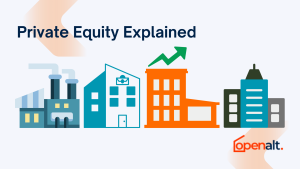What is private equity, and how do private equity firms operate?
- Feb 16
- Written By Adeleine Whitten
Back in the 1980s, private equity was largely fueled by the power of debt. In recent years, however, it’s become a form of alternative investing not just reliant on debt, but also on the worth of individuals looking to diversify and grow their investment portfolios.
Although you may hear the term “private equity” thrown around by financial professionals, you may not be familiar with what exactly that means. Even if you do understand the basic premise, how exactly private equity firms operate and make money could still be a mystery.
Whether you’re interested in becoming a part of a private equity project or just looking to learn a thing or two, our team here at OpenAlt is breaking down everything you need to know about private equity – complete with real-world examples and our analysis of whether or not it’s a good investment.

Private equity explained
Private equity is essentially a firm taking ownership of a business, restructuring and adjusting the business model as they see fit, and then selling it for a profit. Although it’s considered a short-term investment in the grand scheme of things, it takes several years of staying invested and active participation from the firm’s general partners in order for investors to see a return.
Typically what will happen is that individuals will invest in a private equity firm. The private equity firm is made up of general partners – also called sponsors – who will take that money from investors – also called limited partners – and invest it into businesses they’ve identified as good opportunities through due diligence.
Once the private equity firm has taken control of the business, they begin restructuring and making other changes to improve the company’s profitability. This could include changes in management, reevaluating the budget, or redirecting resources to enter or grow in new markets. If the changes that the general partners implement help grow the business, investors are on the right track to turning a hefty profit.
A big reason these private equity firms are able to boost businesses so quickly, as opposed to the rate the business could grow on its own – is that they have money at their disposal. Small businesses especially probably didn’t have the means to invest in their own company without the help of these financial giants. So when private equity firms immediately begin investing in their new portfolio company, the rate of return grows instantly.

Private equity versus venture capital
Although both forms of alternative investing in the private market, private equity and venture capital do have their differences. The biggest differentiator between the two is that private equity aims to take control of a business, while venture capitalists are often only looking for minority stakes.
Another common difference between the two is the state of the business being invested in. Venture capitalists often work with small startups who show great potential but aren’t yet established enough to raise public funding. Private Equity typically focuses on mature businesses that are failing or otherwise deteriorating. Using the expertise of the investors and firm as a whole, private equity aims to take a once well-off business and make it profitable once again.

Example of how private equity investing works
You are an investor looking to expand your portfolio. You meet with several private equity firms to better understand their investments and the level of risk typically associated with their projects. After much research, you decide that ABC Group is a mutual fit. You invest a large sum of capital into ABC Group.
ABC Group, meanwhile, is doing their own due diligence – however, they’re looking for new business opportunities for their firm to invest in. They identify XYZ Company as a good investment opportunity – high potential rewards balanced with reasonable risk. ABC Group works out a deal to use your investment (along with other investors’) to buy enough shares to take ownership of XYZ Company.
The general partners of ABC Group immediately begin making changes to XYZ Company. This includes job restructuring to make the business more efficient and increased budget for new product research. Although XYZ Company may not see returns for several years, ABC Group’s changes eventually begin turning a significant profit.
Now that XYZ Company is in the green, ABC Group begins planning their exit strategy. Remember: this is not a long-term project. The goal of ABC Group is to make a profit for their investors – you being one of them – and then start over with their next project.
ABC Group may decide to pay out some investors before completely selling the company, allowing those individuals to exit early. But once XYZ Company has been sold – ideally, for much more than it was originally acquired for – you and the other investors earn your return.

How do private equity firms make money?
As mentioned in our earlier example, the goal of private equity firms is to increase the value of their portfolio companies in a relatively short time in order to sell them for a profit. That being said, there are other fees involved to keep both the invested business and the private equity firm afloat.
The most consistent stream of revenue for private equity firms is the management fees. In order for investors to become a part of a private equity firm’s projects, they have to pay the firm a percentage of their committed capital. This is typically around 2%, although it can vary. These fees – paid regardless of whether or not the firm is making the investors any profit – allow private equity firms to pay their staff and “keep the lights on”.
Private equity firms may also require their portfolio companies to pay transactional fees. This is a small percentage – often around 1% – of the deal amount, paid when the initial deal takes place.
In addition to these standard fees, private equity firms earn money based on how much profit they turn for their investors. These forms of revenue – called performance fees or carried interest – incentivise general partners to make as much money as possible for the individuals funding the capital. Once returns are paid out to investors, the private equity firm typically takes around 20%, although the exact amount can vary.

Private equity’s role in healthcare
In 2021, the healthcare industry saw $151 billion in private equity deal volume – up from $79 billion in 2019 and just $66 billion in 2020 due to the pandemic – making it one of the top trending industries for private equity firms. In addition to hospitals and private doctors offices, private equity firms are also heavily involved in healthcare staffing facilities.
One of the reasons that private equity investors have taken such an interest in healthcare is to further diversify and minimize risk. Technology is a popular industry for private equity investors to take part in, so balancing that risk with the stability of healthcare helps to lower the overall risk of a firm’s portfolio companies.
As for the healthcare companies themselves, private equity’s increased role has helped these businesses access funding that the rest of the industry may struggle to secure. Although the institution is now functioning like non-healthcare companies – which could mean budget cuts, staffing reductions, and profit-first decisions coming from the top down – the consistent cash flow also means more funding for medical research and advanced technologies.

Private equity’s role in real estate
In the same way they look to improve businesses and sell for a profit, private equity firms have also entered the world of flipping residential real estate. House flipping isn’t a new concept, but private equity firms are primarily focused on rental properties. This especially became popular after the Great Recession, when housing prices and interest rates were low.
By updating the units with hardwood flooring, granite countertops, and new appliances, private equity firms can begin renting out those units at a much higher rate. The rent tenants pay will cover not only the original cost of the property, but also the cost of updating them. In some cases, there may even be some extra profit to spare.
But like any other private equity project, residential real estate is not meant to be a long-term asset for these firms. The apartments or other rental properties are acquired and updated with the intent of eventually selling them off for a profit. Once a property management company takes control of the property, the private equity firm can pay out the last of their investors and move on to their next portfolio company.

Is private equity a good investment?
Private equity, like all other investments, is a balance of risk and reward. The appeal of this asset class is that a large profit can be made in just a few short years. However, portfolio companies can also run into unexpected issues that diminish those returns or, in a worst case scenario, bankrupt the business entirely.
That being said, private equity, historically, has seen generally higher returns than other asset classes. Its low correlation to the rest of the market makes private equity a strong portfolio diversifier, and the various industries private equity deals can occur in diversifies the asset class even further.
In summary – if you, as an investor, have the means to potentially lose whatever you put into these private businesses, it can be a lucrative and profitable investment. However, the actual returns you earn – or losses you sustain – from private equity will depend entirely on the portfolio companies, the business decisions being made, and the activity of the market they exist within.

How can I get started with private equity?
If you have the capital and believe private equity would be a beneficial addition to your portfolio, there are easier ways to begin investing than shopping around for firms to work with.
With OpenAlt, you can browse hundreds of alternative investment opportunities, including private equity. Read about the opportunity, perform due diligence, and initiate your investment directly in the platform. Learn more and schedule a demo at https://openalt.com/contact-us/.
